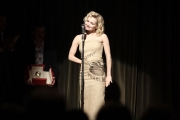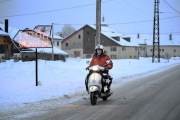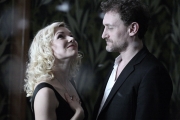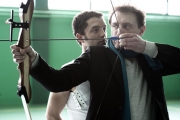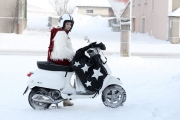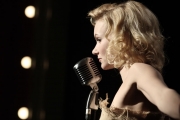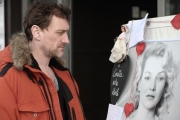Synopsis
Rousseau is a bestselling crime novelist from Paris, troubled by a persistent writer’s block.
Candice Lecoeur is a local beauty gracing the famous ”Belle de Jura” cheese packaging, who, following a hypnosis session, has gotten it into her head that she might well be the reincarnation of Marilyn Monroe.The two meet in the coldest village in France, but only after Candice has been found dead. The case was closed before it even opened and the cause of death declared suicide by sleeping pills. Rousseau is the only one who does not buy it. Reality turns out to be stranger than fiction – and a source of inspiration – as Rousseau uncovers the truth about Candice’s past and her untimely death.
Cast & Crew
Director : Gérald Hustache-Mathieu
Screenwriter : Gérald Hustache-Mathieu
Starring : Jean-Paul Rouve, Sophie Quinton, Guillaume Gouix, Arsinée Khanjian, Olivier Rabourdin, Clara Ponsot, Eric Ruf, Lyes Salem, Joséphine de Meaux, Ken Samuels, Antoine Chappey, Frédéric Quiring, Nicolas Robin
Schedule & Presentation
![]() Presentation by Festival Directors
Presentation by Festival Directors
Saturday, March 31 – 1:00 p.m at the Byrd Theater ~ ![]() 1h42 ~ Mature Audience
1h42 ~ Mature Audience
More informations
Choose a picture to see the filmography (source : IMDB)
![]()
◊ Interview with Gérald Hustache-Mathieu
At the beginning of the film, Candice says that her diaries are “not told with the talent of great writers at all.” David Rousseau, however, thinks that she writes better than he does… Is the lack of self-esteem what this movie is really about?
We could add Marilyn’s own words: “I am not very smart, I think…” or “Others are going to think I am not good or laugh or belittle me or even think I do not know how to play!” The lack of self-confidence, or rather the social complex, is indeed at the core of the film, even if I was not aware of it at first.
When did you realize it was?
At first, I did not know what the movie would be about. I knew that Rousseau was a thriller writer lacking inspiration, and depressed. With Juliette Sales, the co-screenwriter, it took us a long time to figure out how he would have come to this. Rousseau writes staggered thrillers that meet some success, but he was hungry for recognition. He wanted to change his style along with his name and write a novel that would make him more proud. Consequently, he did not write a single line for 4 years. Like Candice or Norma Jeane, he believed that in order to become someone, he had to become someone else. While writing, Juliette and I asked ourselves more precisely what could make a character like this doubt himself so much. That I could answer; I come from a humble background where we do not talk about cinema. I often feel this sense of impersonation. Besides, this feeling goes well beyond a simple social complex; we can feel it regardless of our background. Beyond the autobiographical aspect, I realized that this rather commonplace feeling was actually film material!
At first sight, the role of a taciturn author seems to be a cast against all odds for Jean-Paul Rouve. Why choose him?
When I reflected on the casting, it seemed to me that very few actors met all the requirements to embody Rousseau. I knew that Rousseau had a sense of humor and I knew that Jean-Paul could obviously step into the shoes of such a character. As for the somber, bitter, jaded Parisian side of Rousseau, we needed an actor who could inspire affection in spite of that. I have always found Jean-Paul incredibly touching.
What was it like working with him?
Jean-Paul is quite thorough which suited me well because I am rather a perfectionist myself. He has an incredible knack for acting and he really helped to find the rhythm of the film, and tweak a line to make it funnier. In addition to his role as a comedian, he also acts as a “unifier” for the 40 people on set and this is a precious asset because it allows me a lot more freedom than ever before. Another of his qualities, more surprising for an actor, is his incredibly modest. It is this modesty that seems to illuminate his face in the last scene of the film. I dreamed of capturing this unique quality of his.
It is difficult to define the genre of your film. Is it a thriller or a comedy?
The film genre is interesting for the structure it suggests. For a change, I wanted to tackle the “film noir” genre, since it is the opposite of my previous films. But one cannot really change… For me the thriller aspect is only the backdrop of the movie, which is closer to comedy. In films, I definitely like to mix genres; I like to try and incorporate seriousness and lightness because it seems to be what life is all about.
Where did you get the inspiration for Marilyn Monroe?
This was not planned at all. We were supposed to make a thriller in Mouthe and tell the story of an unlikely encounter: that of an investigator and an already dead victim. Then, in a newspaper article, I read about a psychiatrist who stated that his patient was the reincarnation of Marilyn Monroe. While hypnotized, she would have relived certain moments from her past life, moments that would without question be linked to Marilyn’s life! Just watch on YouTube the so-called documentaries on the subject and you will immediately guess what really happened… Anyway, that was the spark that triggered the whole screenplay because the character of Marilyn is absolutely fascinating.
What about her fascinates you?
I had obviously seen a few of her films, but all I knew about her were the usual clichés. Yet, this article really triggered my desire to get to know her better. For this screenplay, I was looking for an investigation to make up, for a mystery to resolve…What greater mystery than the one of the perfect incarnation of the Hollywood actress, the orphan abandoned to her tragic and mysterious death? Even though she was examined, autopsied, scrutinized and showed us everything from her chest to her bottom, we never stopped searching for Marilyn’s hidden face. She is and will remain one of the great mysteries.
What did you see in her?
Since it was not at all about directing a biopic on Marilyn, I only tried to keep the parts of her that connected to Candice, this girl from Mouthe who thought she was her reincarnation. Little by little, I understood what had made me go to her. Marilyn embodies the American dream, and beyond that, the dream itself. The dream of becoming “someone” someday. But she also presents the other side of the coin; Norma Jeane, the woman behind the star, a real fragility that was about to break at any moment. She had glory, beauty, men always at her feet, but self-confidence near zero. She embodied better than anyone the subject that I wanted to deal with.
For this part, you turned once again to your favorite actress, Sophie Quinton. Was it natural for you to have her play a character inspired by Marilyn Monroe?
With another actress, it might have been a poisoned chalice. But I knew Sophie well enough to be almost certain that with her, we would never fall into mimicry or some sort of fake parody. I have an almost blind confidence in her talent, in the accuracy of her interpretation. But the character of Candice, built through brief flashbacks, was so hard to find that I think she really did have the jitters this time. Even if we walked in Marilyn’s footsteps, we both agreed from the start that we would to never draw inspiration from her or try to mimic her.
There are yet scenes, like the Jokari in The Misfits or the Happy Birthday Mr. President, where you are in the iconic comparison…
Yes, but we did not try to copy these scenes. The Happy Birthday scene has become a myth and is therefore inimitable. It is not about paying tribute at all. The scenes that I sampled become part of the film, like the others. I reuse an element to make a new composition. I did it with complete impunity for Marilyn’s life; some of her films and autobiographical elements are also samples that my movie remixed with the rest. This idea of sampling images and scenes gave me a lot of space to work with. Everything has been said, written, filmed, but in music, we sample, we remix. Why not apply this to cinema? Besides, I am not inventing anything, look at Tarantino for instance!
In the film, a policeman states: “we are not in America, we are in Mouthe.” Why did you choose to shoot your story in that city, which is the coldest in France?
There was something strange about that city and its inhabitants, which was probably due to its rather unusual status of “Little Siberia.” Also, the snowy landscapes of Haut-Doubs make me think of the Mid-West, or more specifically Minnesota. And yet, “we are not in America!” It is very significant by the way that this expression is now common parlance: America is seen as an unreachable place, less geographically than culturally, an inaccessible dream, the territory of an unrivalled mythology. French film directors are faced with this unfair competition with an American myth and I felt like finding ways to get around such a dead end. This is how I went looking for “America” in Mouthe.
Did you find it?
There is something truly universal that all the countries in the world have in common: as there is a “deepest America”, there is a “deepest France”, that of provincials. I shoot the province for what it is: a territory on the fringes of big cities and of which we hear very little except sordid crimes from the back pages of the newspapers. This is a more ordinary France, more modest and a bit deserted, where dreams are less accessible.
Do you believe, as Candice says, that “hell resembles Mouthe?”
In any case, what resembles hell is to be far from everything when you did not choose to. This is why Mouthe was the perfect metaphor. It is an unusual village. Its single central road in the evening resembles the ghost towns of the Far West. It is a border village where the weather has not really taken hold and where winter drags on and on. The roads are icy, the cars paralyzed by the frost, the windshield blanketed with snow and the tires pinned to the ground. Everything contributes to lock you there. The only way out: escape.
For you, what is the “American dream”?
That is THE dream: “I would be safe and warm if I were in L.A”. The illusion of a place far away where everything would be possible. Many characters in the film share such dreams: Leloup sees himself as a scientific detective in Canada, Betty is waiting for her prince charming, and the hair-dresser fancies herself becoming the muse of a novelist. They dream, like everybody else, of social triumph, of being successful in their lives. As simply as that.
Your own complex is not that of an American filmmaker?
And about not even being the reincarnation of one! But in the movie, I believe I provide a response to that dilemma. Rousseau gives up his pseudonym and signs his novel with his own name. He changes its grandiloquent title for an onomatopoeia that I personally find laden with melancholy, but which can seem funny and laughable. In doing so, he allows himself to start over. He accepts himself for who he is.



